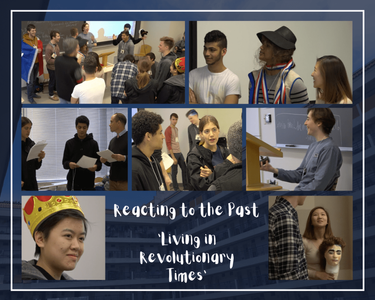Embodied Learning: Teaching and Learning with Reacting to the Past

Contributed by Maria Gapotchenko, Master Lecturer, CAS Writing Program and Writing Coordinator for the Core Curriculum
(3 minute read)
How would you like to be three different persons, from three different eras and places, over the course of three days? This was my experience – intense and exhilarating – as I attended the Reacting to the Past Consortium’s annual Game Development Conference just over a month ago.
On day one, I played Dorothy Kitt, a California Heritage Council member committed to preserving San Francisco’s controversial Pioneer Monument in its original location during the heated discussions of 1991. The next day, I was Jean Berthelet, a young French worker-priest providing clandestine support to the Algerian National Liberation Front as the war for Algeria’s independence was coming to a close. And on day three, my new alter-ego Mr. Archibald Prentice of Scotland, editor of the Manchester Times, was busy soliciting articles from J.S. Mill and Harriet Martineau while the British Parliament debated the repeal of the Corn Laws in the year 1845.
Reacting to the Past, a pedagogy used on dozens if not hundreds of campuses around the country, invites students to take charge of history via immersive role-playing games. How? By embodying particular historical individuals’ intellectual and policy agendas and striving to carry them out through speech-making, backroom negotiations, and other means (which vary depending on the game).
Although often used in history courses, Reacting games are deployed in many other fields: classics (The Crisis of Catiline: Rome, 63 BCE), astronomy (The Pluto Debate), public health (London 1854: Cesspits, Cholera, and Conflict over the Broad Street Pump), environmental science (Acid Rain in Europe, 1979-1989), and art history (Duomo: Building the Italian Renaissance), among others. All games come with an instructor’s manual, which provides guidance for assigning roles, expanding or compressing the game schedule, and structuring game prep or debrief activities.
I have been using Reacting in my writing classroom since 2018 after attending a faculty workshop hosted by a nearby university. My students and I have since “time-traveled” to late 19th century imperial Russia, to the site of Washington, DC’s Vietnam Veterans Memorial in 1981, and to the Athenian Pnyx in 403 BCE. I also recently started co-teaching a Cross-College Challenge course (please see description for HUB XC 410 C1) in which students get to research and create their own Reacting microgames. The Game Development Conference would naturally be my next step: as an aspiring game author, I desired to see what it was like to see a game being born.
I was not disappointed by the conference. In addition to taking part in three playtests alluded to above, I attended pedagogy workshops on topics such as how to help Reacting students better digest primary sources and I also listened to six different game pitches – possibly my favorite part of the conference. What could be more fun, for example, at least for this Francophile, than to hear a pitch about a game in which Christine de Pizan goes head-to-head with the author of the sexist Roman de la Rose? And for the more adventurous among us, there was always the special playtest of “Five-Hundred-Year-Old-Vampire.”
I hope my BU colleagues will give this pedagogy a try. It’s deep, it’s rich, it’s fun. It moves one to think and feel in more imaginative ways. It challenges. It encourages. It helps students weave that delicate, intangible web we call “historical context” as they research their characters in preparation for the game.
Want to learn more about Reacting to the Past? Here’s some quick follow-up:
- Read my XCC co-teacher (and the inspiration behind our course) Kathryn Lamontagne’s vivid piece on Reacting and experiential education.
- Play a conference version of one of the published games at the upcoming annual Winter Conference, to be hosted online again by University of Georgia (more information will also be posted here in mid-September). Don’t forget to take advantage of BU’s institutional membership status if you decide to go!
- Register to attend a free webinar on Tuesday, September 13 at 1pm EST, offered by The Reacting Consortium and the Gardner Institute. This webinar is open to faculty, staff, and teaching assistants who are interested in learning more about RTTP to foster deep learning.
Note: Maria attended the Reacting to the Past Consortium’s Annual Game Development Conference with support from the Salaried Lecturer Professional Development fund.